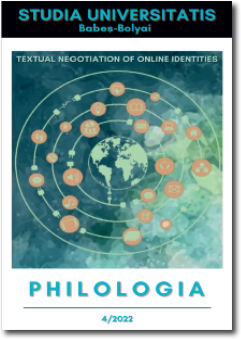THE DIGITAL DISCOURSE OF ROMANIAN SOCIAL MEDIA PROSUMERS DURING THE COVID-19 PANDEMIC
DOI:
https://doi.org/10.24193/subbphilo.2022.4.03Keywords:
clicktivism, digital discourse, digitized practices, prosumers, debunkingAbstract
The Digital Discourse of Romanian Social Media Prosumers during the COVID-19 Pandemic. Social media platforms provide the digital playground for users to manifest a strong form of clicktivism and, at the same time, a deep sense of belonging. In this digital space, users produce discourses with in-built ideologies which have a strong impact on society. Through digitized practices (following, sharing, commenting, posting), users become social actors who design and redesign their behaviour and life choices in relation to the individuals and groups which they follow online on a regular basis. In the context of the Covid-19 pandemic, through the use of social media, various users have become movers and shakers in Romania. This study aims to analyse the new media discourse showing the Romanian people’s attitude towards the Covid-19 pandemic in the time span of September-October 2021. As such, the linguistic manifestation of users (including micro-celebrities and public figures) was reflected in the polarization of Romanian society, resulting in people mistrusting authorities, and medical experts and giving voice to users who would not normally have a voice in the matter of a global pandemic.
Article history: Received 5 August 2022; Revised 8 November 2022; Accepted 14 November 2022; Available online 20 December 2022; Available print 30 December 2022.
REZUMAT. Discursul digital al prosumatorilor români de rețele de socializare în timpul pandemiei COVID-19. Platformele de socializare oferă utilizatorilor terenul de joacă digital pentru a manifesta o formă puternică de clicktivism și, în același timp, un sentiment profund de apartenență. În acest spațiu digital, utilizatorii produc discursuri cu ideologii încorporate care au un impact puternic asupra societății. Prin intermediul practicilor digitalizate (urmărire, partajare, comentarii, postări), utilizatorii devin actanți sociali care își proiectează și își reproiectează comportamentul și opțiunile de viață în raport cu persoanele și grupurile pe care le urmăresc online în mod regulat. În contextul pandemiei Covid-19, prin utilizarea rețelelor sociale, diverși utilizatori au devenit promotori și actanți în România. Acest studiu își propune să analizeze discursul noilor media care arată atitudinea românilor față de pandemia Covid-19 în intervalul de timp septembrie-octombrie 2021. Ca atare, manifestarea lingvistică a utilizatorilor (incluzând micro-celebritățile și figurile publice) s-a reflectat în polarizarea societății românești, ceea ce a dus la neîncrederea oamenilor în autorități, precum și în experții medicali și a dat glas unor utilizatori care, în mod normal, nu ar fi avut o voce în contextul unei pandemii globale.
Cuvinte-cheie: clicktivism, discurs multimodal, practici digitale, prosumator, demascare
References
Altieri, Elena. 2021. “Foreword.” In Social Media and Covid-19. A Global Study of Digital Crisis Interaction among Gen Z and Millennials, edited by Ingrid Volkmer, VIII. Melbourne: University of Melbourne.
Alverman, Donna. 2017. “Social Media Texts and Critical Inquiry in a Post-Factual Era.” Journal of Adolescent & Adult Literacy 61, 3: 335–38. https://www.jstor.org/stable/26631136
Barthes, Roland. 1981. Camera Lucida: reflections on photography. Translated by Richard Howard. New York: Hill and Wang.
Bârgăoanu, Alina. 2021. “Tendința anului 2021: „NOI” împotriva „LOR” – indiferent care ar fi subiectele aflate în discuție.” Q Magazine. July 25, 2022. https://www.qmagazine.ro/tendinta-anului-2021-noi-impotriva-lor-indiferent-care-ar-fi-subiectele-aflate-in-discutie/?fbclid=IwAR3shtXeBhB1nXbgID8Nu KM0wzvktpJwZSizQHwAi5-nlIkYrY22fscOJPI
Buzzetto, Nicole. 2013. “Social Media and Prosumerism.” Informing Science and Information Technology 10: 67-79.
Caplan, Robyn, Lauren Hanson, Joan Donovan. 2018. Dead Reckonin: Navigating Content Moderation after “Fake News”. New York: Data & Society Research Institute.
Lang, Bodo, Rebecca Dolan, Joya A. Kemper, Gavin Northey. 2020. “Prosumers in times of crisis: definition, archetypes and implications.” Journal of Service Management ahead-of-print 32, 2: 176-189. https://doi.org/10.1108/JOSM-05-2020-0155
George, Jordana J., Dorothy E. Leidner. 2019. “From Clicktivism to Hacktivism: Understanding Digital Activism.” Information & Organization 29, 3: 1-64. https://doi.org/10.1016/j.infoandorg.2019.04.001
Globsec. 2020. Voices of Central and Eastern Europe Perceptions of Democracy & Governance in 10 EU Countries [Internet]. July 28, 2022. https://www.globsec.org/sites/default/files/2020-06/Voices-of-Central-and-Eastern-Europe_print-version.pdf
Jenkins, Henry. 2016. “Defining Participatory Culture.” In Participatory Culture in a Networlked Era. A Conversation on Youth, Learning, Commerce, and Politics, edited by Henry Jenkins, Mizuko Ito, and Danah Boyd, 1-32. Cambridge: Polity Press.
Kvetanová, Zuzana, Anna Kačincová, Magdalena Švecová. 2020. “Debunking as a Method of Uncovering Disinformation and Fake News.” Synergy of the Media Industry Segments in the Context of Critical Political Economy of Media, 1:1-20. https://www.doi.org/10.5772/intechopen.93738
Lacković, Nataša. 2020. “Thinking with Digital Images in the Post-Truth Era: A Method in Critical Media Literacy.” Postdigit Sci Educ, 2: 442–462. https://link.springer.com/article/10.1007/s42438-019-00099-y
Marica, Irina. 2021. “Study: Facebook remains the most popular social media platform in Romania.” Romania Insider, October 2021.
https://www.romania-insider.com/study-facebook-social-media-romania
Modreanu, Simona. 2017. “The Post-Truth Era?” Human and Social Studies 6, 3: 7-9. https://doi.org/10.1515/HSSR-2017-0021
Powell, Thomas E., Hajo G Boomgaarden, Knut De Swert, and Claes H. de Vreese. 2015. “A clearer picture: the contribution of visuals and text to framing effects.” Journal of Communication 65, 6: 997-1017. https://doi.org/10.1111/jcom.12184
Silver, David. 2009. The Social Networking Business Plan. Hoboken: John Wiley and Sons.
Shane-Simpson, Christina, Adriana Manago, Naomi Gaggi, and Kristen Gillespie-Lynch. 2018. “Why do college students prefer Facebook, Twitter, or Instagram? Site affordances, tensions between privacy and self-expression, and implications for social capital.” Computers in Human Behavior 86: 276-288.
Sutkutė, Rūta. 2016. “Social media as a tool of resistance or a new form of slacktivism?” Tiltas į Ateitį 10, 1: 427-433. https://hdl.handle.net/20.500.12259/56740
Toffler, Alvin. 1980. The Third Wave. New York: William Morrow and Company.
Thurlow, Crispin, and Kristine Mroczek (eds.). 2011. Digital Discourse. Language in the New Media. Oxford: Oxford University Press.
Downloads
Published
How to Cite
Issue
Section
License
Copyright (c) 2022 Studia Universitatis Babeș-Bolyai Philologia

This work is licensed under a Creative Commons Attribution-NonCommercial-NoDerivatives 4.0 International License.





 ©Studia Universitatis Babeş-Bolyai Philologia. Published by Babeș-Bolyai University.
©Studia Universitatis Babeş-Bolyai Philologia. Published by Babeș-Bolyai University.